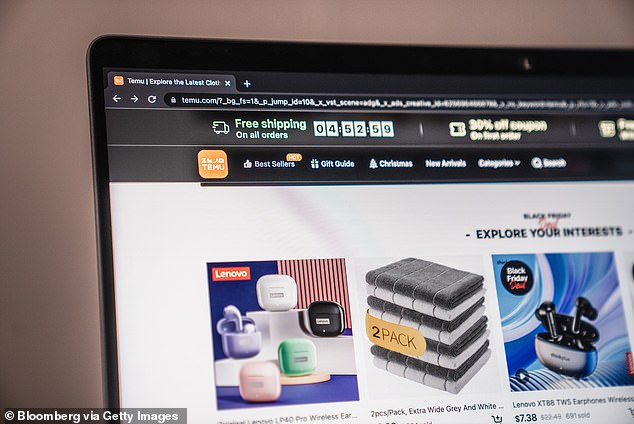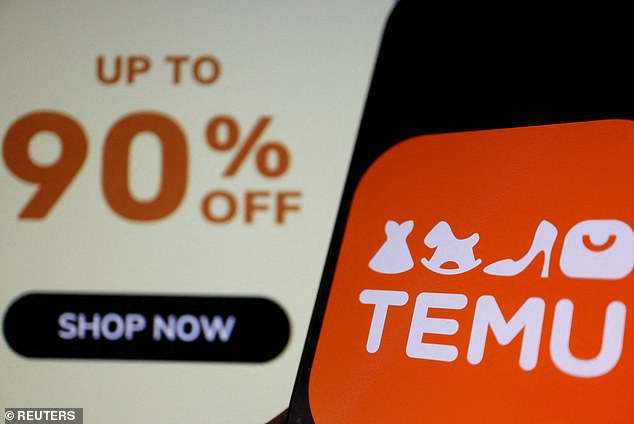Spin the roulette wheel for an exciting mystery reward, win huge discounts by playing a beating-the-clock game or strike it lucky and enjoy 100 pc savings.
No – you’re not at the fun fair but buying rock-bottom priced items from the Chinese shopping website Temu. The online platform, which opened in Britain two years ago, uses such ‘gamification’ tricks to make people buy more than they initially intended.
And with a mind-boggling choice of thousands of items up for grabs – everything from practical household goods and innovative tech gadgets to novelty gifts and clothing – interest in Temu is booming.
The platform enjoyed record worldwide sales of more than £50 billion last year. But retail experts warn there is concerning side to this aggressive marketing technique – as it can get people hooked on a habit they struggle to kick – turning them into Temu addicts.
Confessions of a Temu addict
Lucy Clark is a self-confessed Temu addict – having first been lured to the shop when looking for a novelty toy for her two-year-old French Bulldog Rickson.
The 28-year-old business support director from Manchester spent £1 on a quacking rubber duck for her dog last year – but decided she could not stop there and purchased more items at the same time to get further discounts and free postage. Over the past year she has already shelled out at least £300 on more than 200 ‘mostly rubbish’ items.
She says: ‘Unfortunately, it never got better after that first purchase – Rickson still loves playing with the duck from time to time. Most of the stuff is just tat. What started out as a novelty purchase fast accelerated into a spending habit I could well do without but simply cannot kick. I now make at least one order a month.’

Lucy Clark, 28, is a self-confessed Temu addict. She was lured to the shop when looking for a novelty toy for her two-year-old French Bulldog Rickson

Experts warn that our increased reliance on mobile phones – and a tendency to scroll through websites when we are bored – is a key tool in the Temu armoury
Shoppers such as Lucy have their senses scrambled with exciting items at super cheap prices that are so low that buying feels like saving cash – rather than spending.
She says: ‘Once you log on to the website you get caught up in the excitement of the game. Before you know it, there are £20 or £30 worth of so-called bargains in your basket that, if I am being honest, is usually worthless junk. But the prices are hard to resist – and spinning wheels and pop-up windows offering huge discounts encourage me to make impulsive decisions. The more I purchase, the bigger the discount – and this feels great. Typically, I pick up perhaps 20 items a shop. I also get a thrill of anticipation. It can take three weeks for the goods to come from China, by which time I have forgotten what was purchased and am keen to find out.’
Lucy says unwrapping Temu purchases is a pursuit people share on social media such as TikTok – which is what first encouraged her to visit the platform. She does not post videos herself. But Lucy says: ‘After the initial excitement of ripping open the packages most items soon end up in the bin.’
Among the ‘rubbish’ she has received are heaps of kitchen utensils purchased for £2 or £3, such as vegetable choppers, which are flimsy and break after a couple of times being used. But Lucy believes the ‘most useless’ item she has purchased is a £1 bow tie for her beloved dog. She says: ‘Rickson just sits there looking at me bored. I thought a dickie bow might cheer him up and make him look smarter for special occasions. But sadly, the present was rubbish and did not even fit his neck.’
Yet despite spending hundreds of pounds Lucy is still not ready to kick her addictive habit – and like any gambler, she lives in hope.
How gamification gets you hooked
Temu uses the tagline ‘shop like a billionaire’ to lure customers into spending money.
But you will not be purchasing billionaire items, such as super-yachts, but targeted with super-cheap items that lure you in because they look like fun or are intriguing potentially practical gadgets.

Temu will use timers and countdowns to encourage customers into believing that time is running out before a deal disappears
For example, a solar powered luminous owl for £4.90 (price slashed from £41.27), a foldable haircut cape for £1.60 (reduced from £14.37), £1.61 mosquito repellent wristband (usual price £10.19) or a £2.86 bedside phone stand that retails at £12. If you bought these you would have spent around £10 but experts warn frittering away even small amounts is spending money that could have gone on grocery shopping, paying utility bills or into savings.
Doctor Mark Griffiths, professor of behavioural addiction at Nottingham Trent University, says: ‘The problem arises, like for those with a gambling habit, when you can start spending more than you need to – or can afford. There is a fine line between gamification enhancing an experience to turning it into exploitation. Some people are particularly vulnerable to this shopping trick – but everyone needs to be aware of habitual behaviour and keep it in check when visiting such shopping websites. To ensure things do not get out of hand set yourself a strict budget and try to be disciplined.’
Griffiths points out that Temu will use timers and countdowns to encourage customers into believing that time is running out before a deal disappears, and this heightens the senses and adds to the thrill – just like a fruit machine. But he warns it also brings a sense of urgency that can be dangerous if you buy without thinking. Pop-up windows, that include offering 100 pc off if you buy three ‘gifts’, only add to the sense you must spend.

‘Temu is as addictive as sugar – making shopping seem fun using these gamification tricks,’ says retail expert Neil Saunders
Retail analyst Neil Saunders, managing director of GlobalData’s US retail, says: ‘Temu is as addictive as sugar – making shopping seem fun using these gamification tricks. It easy to get you hooked with novelty and unusual items offered at ridiculously low prices. The website continually changes the prices – and discounts on offer – to keep you coming back for more.’
He adds: ‘The idea is for you to get a dopamine hit from shopping on its website. Just like sugar, it is okay in moderation. But it can become addictive because people can get a thrill from thinking they are saving money on super-cheap goods rather than spending.’
Temu targets shoppers using a mobile phone
Experts warn that our increased reliance on mobile phones – and a tendency to scroll through messages and websites when we are bored – is a key tool in the Temu armoury.
Doctor Janina Steinmetz, a professor in marketing at Bayes Business School in London, says: ‘Once you have downloaded the app on to your phone you get inundated with special offers sent via email and it is easy to give in and have a look.’
She adds: ‘You then get a sense of being awarded for spending – which provides instant gratification. This can be really appealing when you are just sitting around on your phone doing nothing else.’
Elizabeth Clark, chief executive of technology firm Dream Agility, says: ‘Temu wants to push you on to a smartphone for shopping so it can keep bothering you all day and night with messages in the hope you eventually bite and start spending.’ She adds: ‘Unlike with traditional shopping websites, you do not just put things into a basket and leave them there to come back to later. It wants you to buy there and then without reflecting on what you are doing.’
Clark adds: ‘Temu also seems to make it hard to send stuff back to China. It is so cheap it is hardly worth the hassle.’
Temu often includes ‘free shipping’ within the price. But to make a return Temu likes you to jump through hoops. It tells customers to click on ‘save your order’ and then the ‘return/refund’ button. You select the item you would like to return and should provide the reason. Temu states: ‘Return shipping is free on your first return of one or multiple returnable items for every order within 90 days from the date of purchase.’ The means that you should also factor in the time that it took for the items to arrive.
Temu says: ‘Consumers shop with us because they want a wide range of quality products at low prices. We seek to make the experience as enjoyable and rewarding as possible, and this includes offering opportunities to benefit from exclusive deals and discounts.’
